Implement Structured Data
SEO for Airlines
Structured data is a standardized format to provide information about a page and classify the page content. It helps Google and other search engines understand the content of a page.
Structured data also allows Google to enable search results features, known as rich snippets. However, even if the structured data is implemented correctly, there is no guarantee that Google will display rich snippets in search results.
Here is an example of a rich snippet from a Product schema type on Air Europa:

1. Use the right structured data format
Although most structured data for search uses schema.org vocabulary, you should rely on Google’s documentation. If Google does not specify attributes or objects for structured data, it means that they are not required for search even if schema.org requires them. Still, Google can support other schema.org structured data that is not included in the documentation.
As a general principle, the more attributes or objects you define, the more likely is that Google will display rich snippets for the marked-up pages. However, keep in mind that it’s better to provide less but more accurate information!
There are three implementation formats for structured data:
You can test the compliance with the correct structured data format using the Structured Data Testing Tool.

If you see errors or warnings, you can dig deeper by clicking on each detected structured data and check the recommendations and issues.
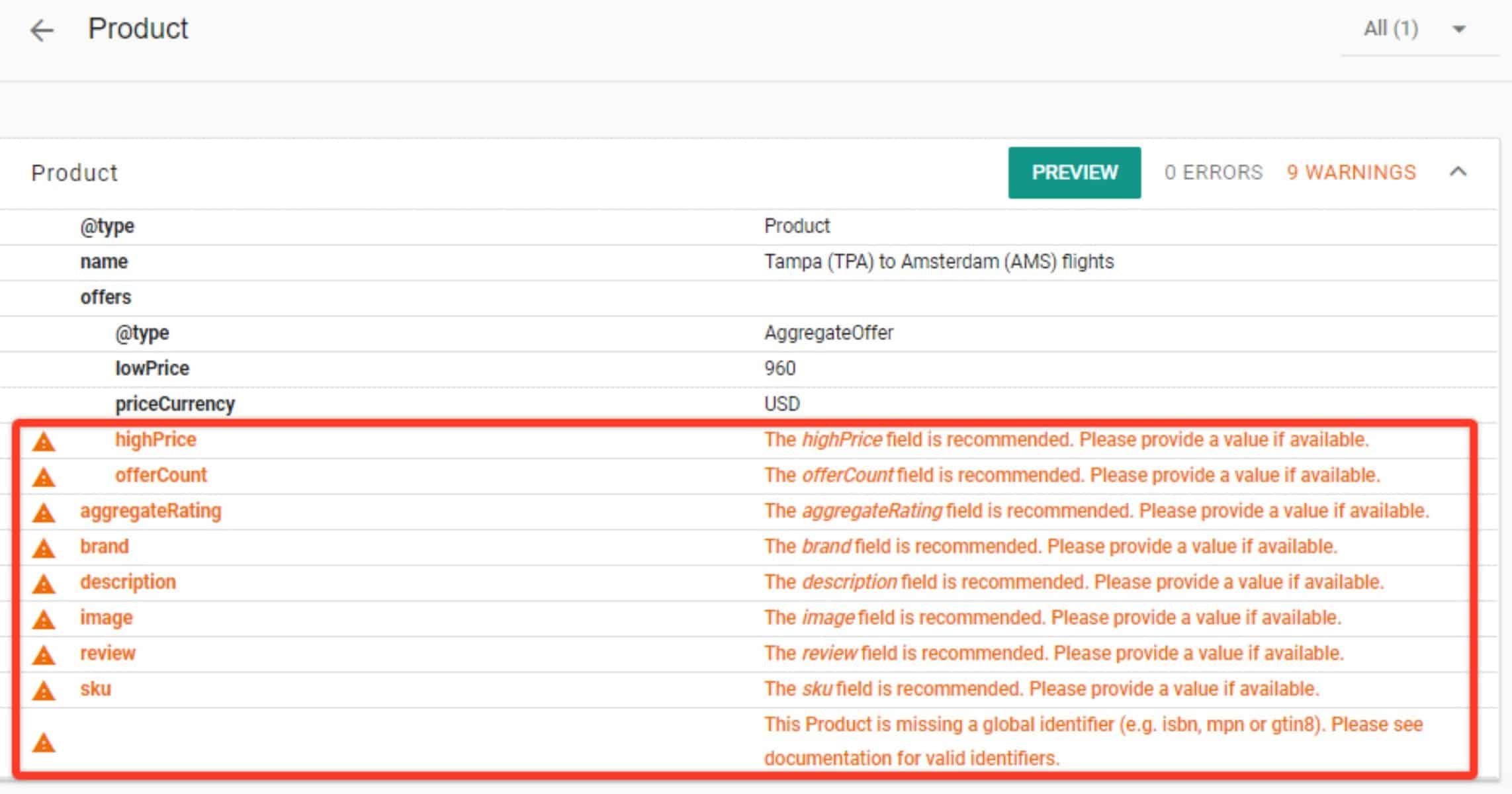
Keep in mind that Errors will invalidate the implementation while Recommendations are just suggestions by Google to improve the quality of the schema. Even if your structured data has a bunch of Recommendations, as the above screenshot shows, the implementation is still valid. Besides, some Recommendations might not be applicable to all pages or websites.
Likewise, the Rich Result Test tool can tell you whether a page is eligible for rich results.
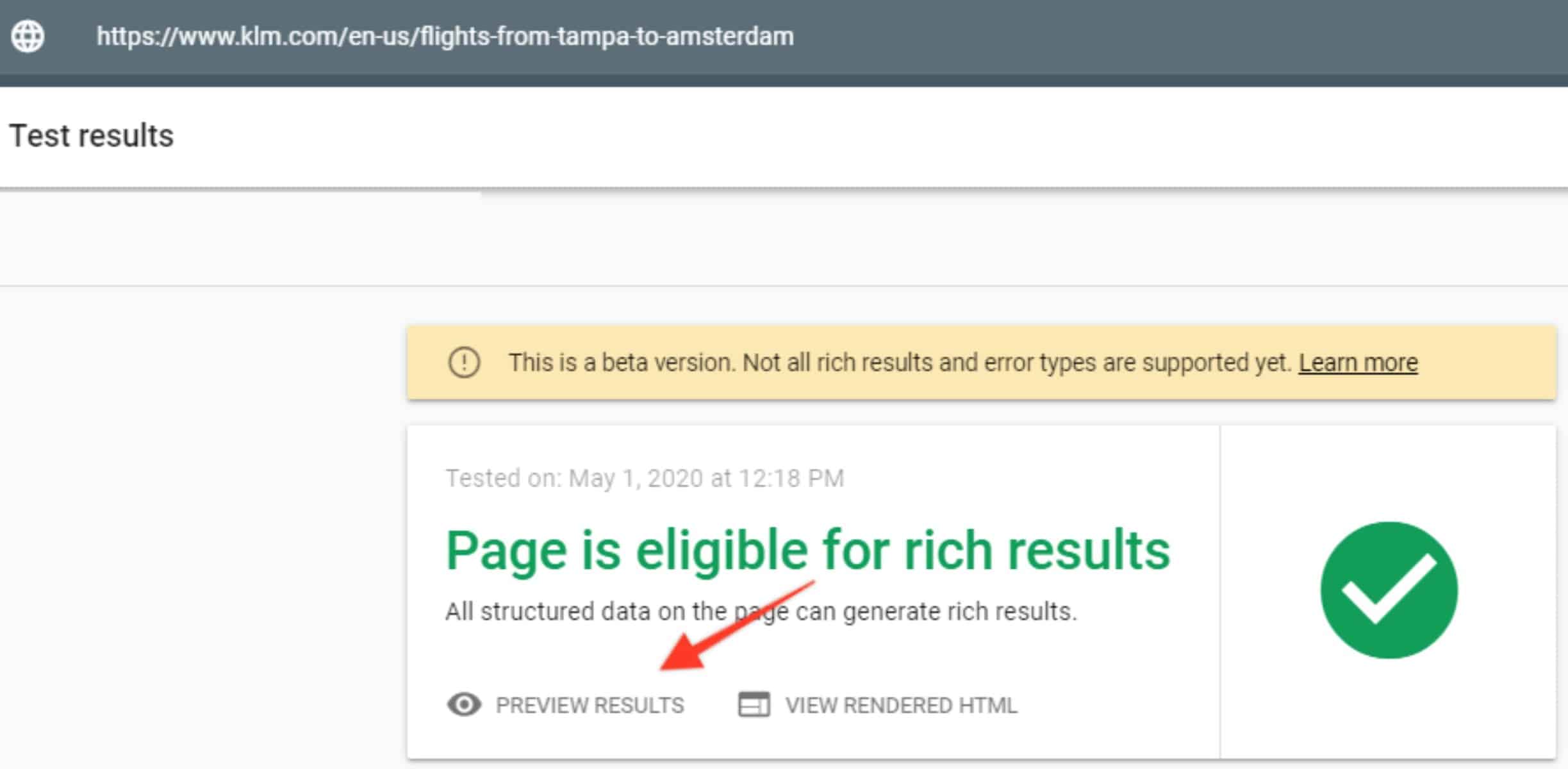
You can even see how the rich result will look like in search by click on Preview Results:
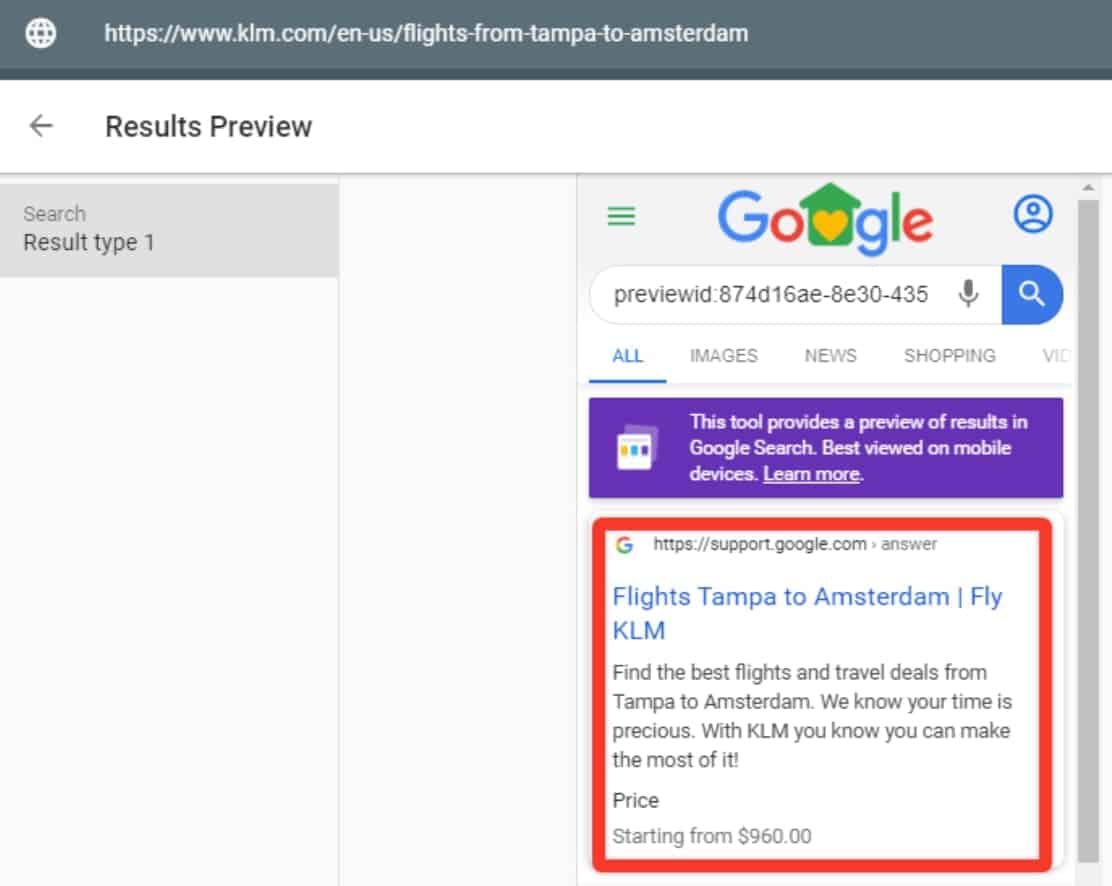
Unfortunately, this tool does not support all rich results yet. For a full list of supported rich results, check Google’s documentation.
You can also monitor and troubleshoot errors in the Google Search Console Enhancement report.
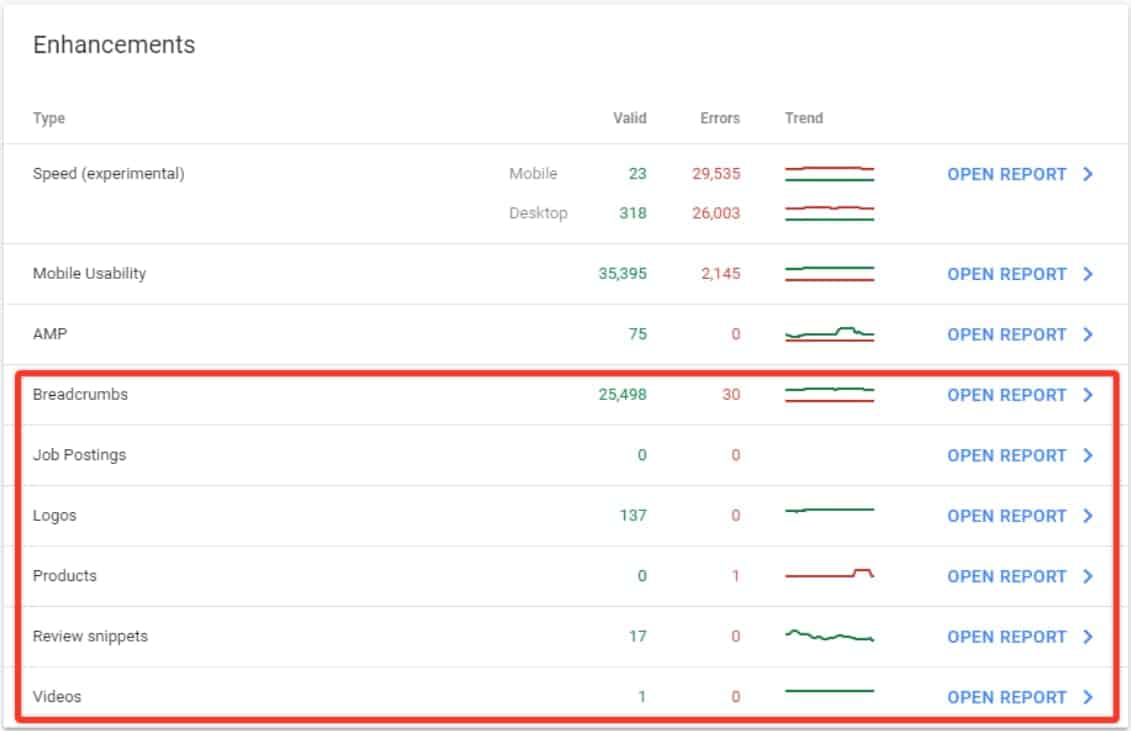
If you find problems in the structured data, fix it, retest with the URL Inspection Tool, and request another index.
Review Google’s most common structured data errors for additional insights.
2. Follow the structured data quality guidelines
Google has defined strict quality guidelines for structured data. In case of a violation, Google won’t display rich results or, in the worst case, it can take manual action against the site.
Here are the most important quality guidelines for structured data:
- Provide updated information.
- Don’t mark up content that is not visible to the user.
- Don’t mark up misleading or deceiving content, such as fake reviews or impersonation of a person or organization.
- Don’t mark up content that promotes pedophilia, bestiality, sexual violence, violent or cruel acts, targeted hatred, or dangerous activities.
- Don’t mark up content that engages in illegal activities or promotes harm to others.
- Don’t mark up content that is irrelevant to the focus of the page.
- Specify all required properties for the structured data.
- Put the structured data on the page that it describes and on all duplicate pages for the same content.
- Use markup for a specific product, not a category or list of products.
- If using images on the structured data, the image URLs must be crawlable and indexable.
- If you mark up one item in a list you must mark up all items. For example, on a flight from Miami to New York page listing fare modules, if a fare module is marked up as a Product schema type, then all fare modules must be marked up.
If the site has been hit with a manual action by Google, review the Manual Actions report in Google Search Console, identify the affected pages and fix the issue in compliance with the technical and quality guidelines. Finally, submit a Reconsideration Request and wait for the results.
3. Implement relevant structured data
There are hundreds of structured data types, but not all of them apply to an airline’s website. You can review the list of schemas at schema.org and on Google’s search gallery.
Based on our experimentation with dozens of structured data types across 50 airlines, the types that we find more relevant to any airline’s website are Airline or Organization, BreadcrumbList, Flight, aggregateOffer, and FAQ.
airTRFX, our fare marketing platform, can handle most of these structured data types for airlines.
Provides information about the airline, such as the legal name, IATA code, address, email, logo, etc.
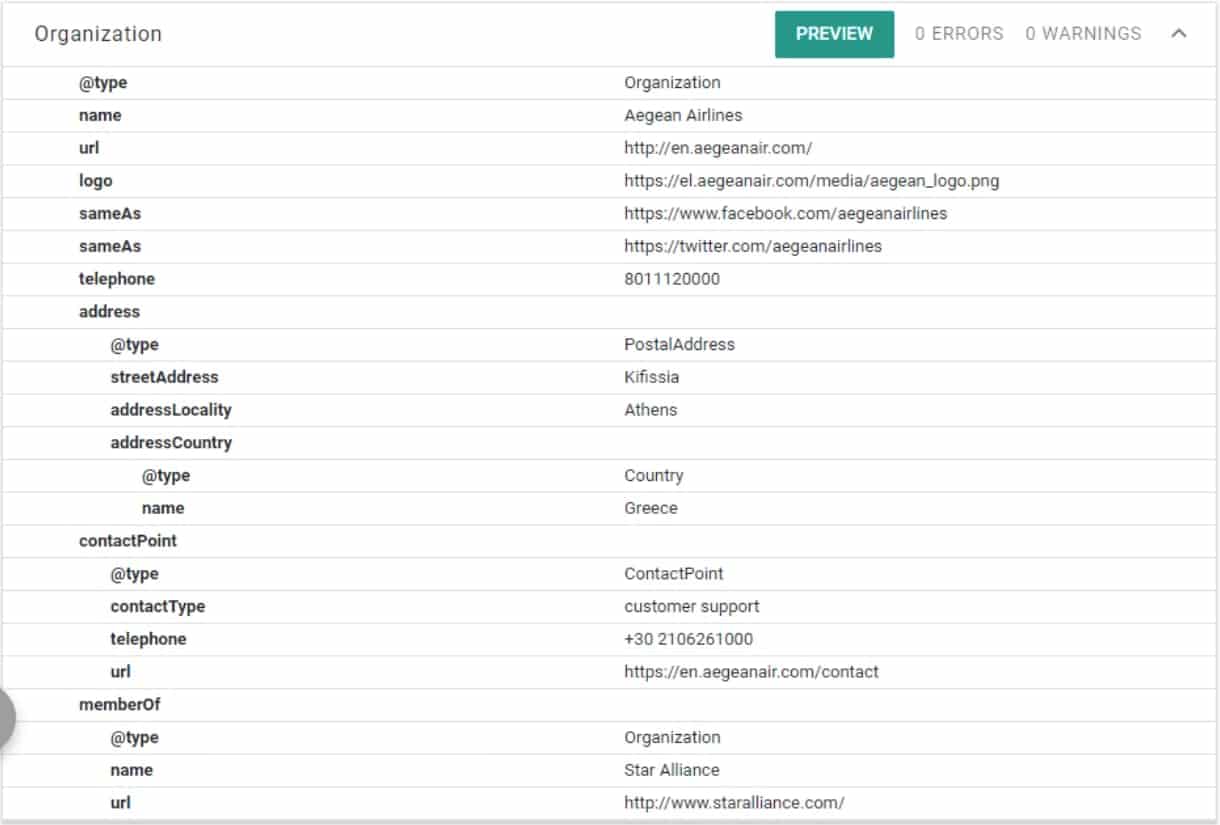
It marks up the path of internal links from the homepage to the current page. Google Search may use it to display the path to the page in search results.
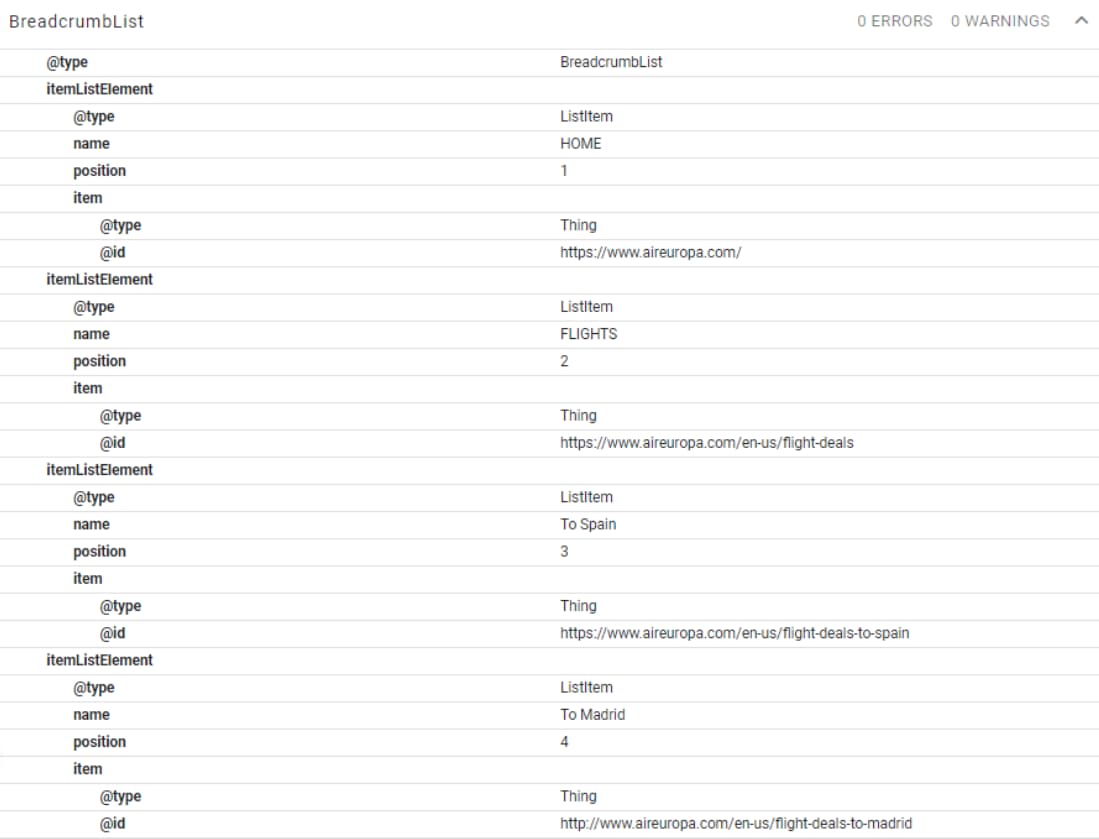
It represents an airline flight and includes information such as the departure and arrival gate, terminal, and airport; the type of aircraft, the flight number, duration, and distance; and more. This structured data type is especially suitable for installation on flight pages.
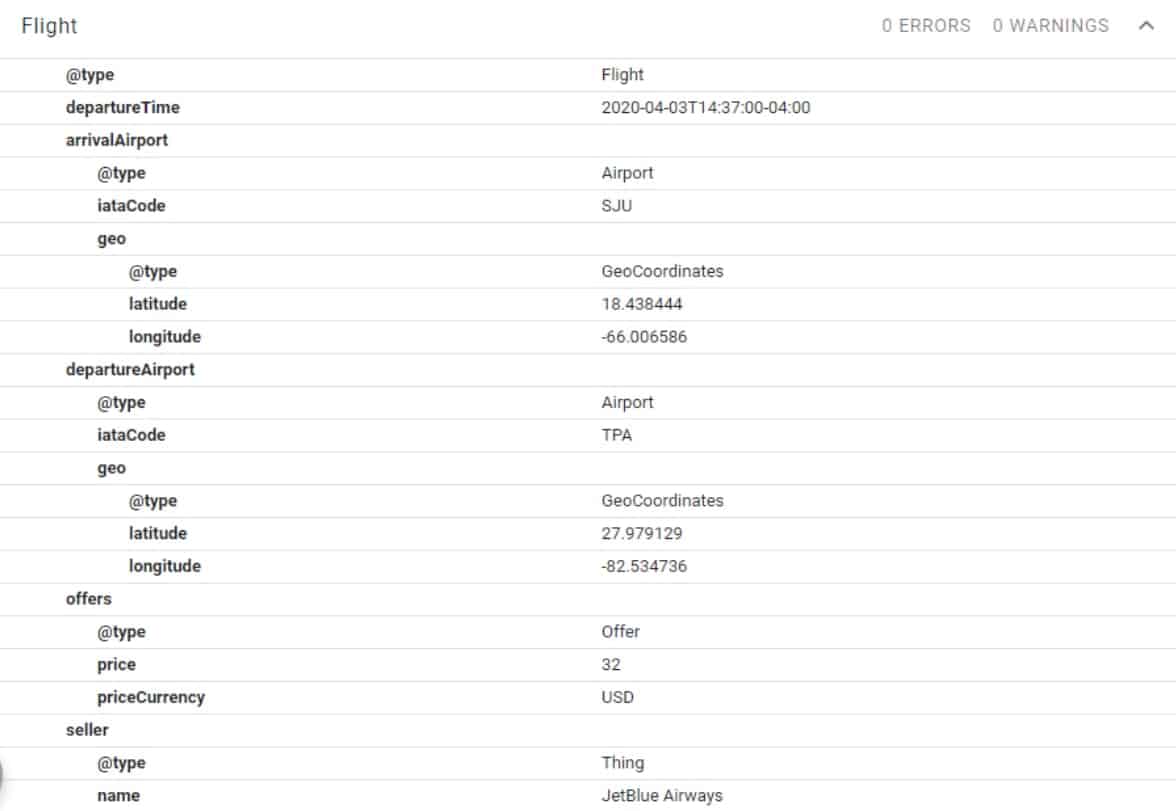
It represents an aggregation of offers within a product and includes information such as the product name, description, currency, and lowest price.

A word of caution, though. One of Google’s data structured quality guidelines indicates to “use markup for a specific product, not a category or list of products.” Therefore, you want to make sure that the aggregateOffer schema is installed on an actual product page, instead of on a category page.
For example, on any airline’s website, the most common page templates where a Product schema type may seem applicable at first are:
- Flights to [Destination]
- Flights from [Origin] to [Destination]
- Flights from [Destination]
However, if you think about it, the Flights to [Destination] and Flights from [Origin] can be considered as product category pages. That’s because on any of those page templates you will find multiple flight routes instead of just one. For example, on a Flights to New York page, there may be several flight routes departing from different locations to New York.
Although some OTAs seem to be getting away with it, such as TripAdvisor and Skyscanner, Google already took action against them in 2016 due to their noncompliance with the quality guidelines. In all fairness, all Google did was to remove their rich snippets from the search results.
Still, we recommend installing the aggregateOffer structured data on the Flights from [Origin] to [Destination] page template only, just to be on the safe side.
Google started to support the FAQ structured data just in 2019. Since then, it has become widely popular in some verticals. The travel industry is one of them, with virtually all top organic OTAs using it on flight route pages, including Kayak, Expedia, Skyscanner, CheapOair, and CheapFlights.
The FAQ structured data is suitable for a page that contains a list of questions and answers pertaining to a particular topic, provided that users cannot submit answers.
There also are some implementation requirements specific to the FAQ structured data:
- Each question should include the entire text of the question, and each answer should include the entire text of the answer.
- The question or answer cannot include any of the following types of content: obscene, profane, sexually explicit, graphically violent, promotion of dangerous or illegal activities, or hateful or harassing language.
- All FAQ content must be visible to the user.
- If there is FAQ content that is repetitive on the site (meaning, the same question and answer appear on multiple pages), mark up only one instance of that FAQ for the entire site.
The FAQ structured data is particularly appealing to travel sites because of the large real estate it takes in search results. Here is an example from Kayak:
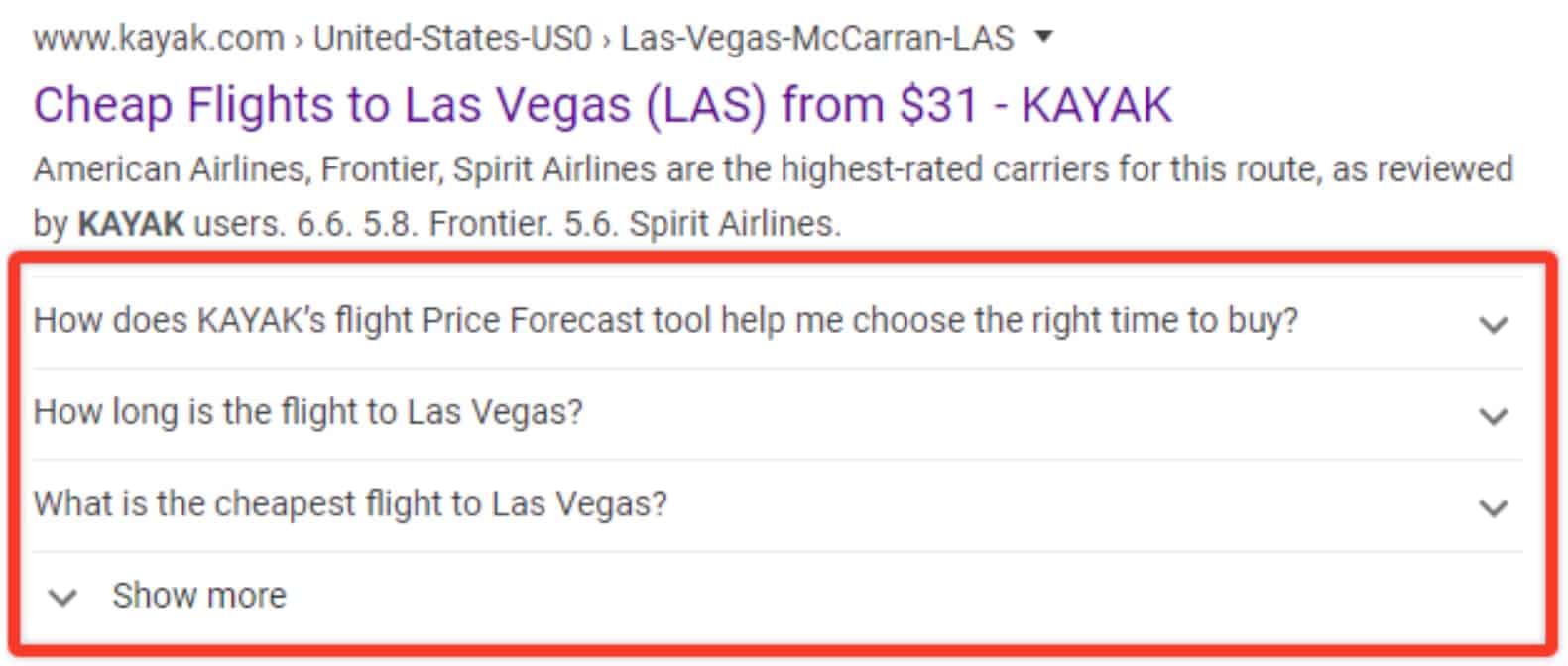
Here is the FAQ markup looks like for one question and answer:

We recommend using different questions based on each page template, as shown below:
Page template: Flights to [Destination]
- How long is a flight to [Destination]?
- How much is a [Airline] flight to [Destination]?
- What is the cheapest [Airline] flight to [Destination]?
- When to buy cheap [Airline] flights to [Destination]?
- How many [Airline] flights to [Destination] are there per day?
- What is the least-busy month to travel to [Destination] with [Airline]?
- What percent of [Airline] flights to [Destination] gets delayed?
- What airport is closest to [Destination]?
- What car rental companies are at [Destination] airport?
- Can you take an Uber from [Destination] airport?
Page template: Flights from [Origin] to [Destination]
- How long is the flight from [Origin] to [Destination]?
- How many [Airline] flights depart from [Origin] to [Destination] per day?
- Are there [Airline] non-stop flights from [Origin] to [Destination]?
- How much is a [Airline] flight from [Origin] to [Destination]?
- What is the cheapest [Airline] flight from [Origin] to [Destination]?
- What is the cheapest day to fly from [Origin] to [Destination] with [Airline]?
- When is the earliest [Airline] flight from [Origin] to [Destination]?
- When is the latest [Airline] flight from [Origin] to [Destination]?
- What percent of [Airline] flights from [Origin] to [Destination] gets delayed?
- Which airports will you be using when flying from [Origin] to [Destination] with [Airline]?
Page template: Homepage
- Where does [Airline] fly to?
- Does [Airline] fly international?
- What are [Airline] most popular destinations?
- How to book flights on [Airline]?
- When to buy [Airline] flight tickets?
- How to get cheap [Airline] flight tickets?
Useful Tools and Resources
- Schema.org site
- Google’s structured data guidelines
- Google’s guide to build and test structured data
- Google search gallery
- Structured Data Testing tool
- Rich Results Test tool
- Google’s Rich Result Test documentation
- Google Search Console Enhancement report
- Google Search Console URL Inspection tool
- Google Search Console Manual Action report
- Airline structured data
- Airline structured data
- BreadcrumbList structured data
- AggregateOffer structured data
- FAQ structured data
